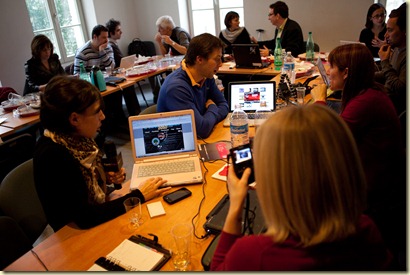Archive for 'Economic Development'
With the Traveling Geeks @ Pearltrees
The Traveling Geeks met with Patrice Lamothe from Pearltrees (@pearltrees) for nearly two hours at the beginning of the Traveling Geeks tour.
This guy is running the Internet startup buzz playboo k like perfect, at least for a French startup: he did a tour in the Silicon Valley visiting local influencers and bloggers, sponsored the Traveling Geeks and Leweb, talking at Leweb in plenary session (twice…), creating plug-ins, buttons, that can be placed everywhere on social sites, his site is in English, and so on. As a result, he got heck of a good visibility. And we were very kindly welcomed in the company which looks like an US startup: lots of coffee and… US sized patisserie. (more…)
k like perfect, at least for a French startup: he did a tour in the Silicon Valley visiting local influencers and bloggers, sponsored the Traveling Geeks and Leweb, talking at Leweb in plenary session (twice…), creating plug-ins, buttons, that can be placed everywhere on social sites, his site is in English, and so on. As a result, he got heck of a good visibility. And we were very kindly welcomed in the company which looks like an US startup: lots of coffee and… US sized patisserie. (more…)
With the Traveling Geeks @ Paris Incubator
 The Traveling Geeks visited one of the five incubators from Paris Development, a joint venture between the City of Paris and the Paris Chamber of Commerce.
The Traveling Geeks visited one of the five incubators from Paris Development, a joint venture between the City of Paris and the Paris Chamber of Commerce.
Paris Development has been in place for 10 years and has two goals: have foreign companies settle in Paris and help local startups. All in all, they incubate 100 startups representing 600 folks. 200 work in the “rue des Haies” incubator we visited, one that is dedicated to digital medias. But the presenting startups came from all the incubators from Paris. Incubated companies pay for staying in the incubator, although it’s quite modest in comparison with normal commercial offices price. And it includes all services (network, phone, welcome desk, etc). They have a long waiting list of startups and welcome only 7% to 8% of the candidates. Companies stay in the incubator for a maximum 4 years. (more…)
Paris Diary: Putting “French” Back Into Entrepreneur
![]()
The quality of the French startups we have been meeting with all week, has been very good.
It seems as if the French can once again claim back ‘entrepreneur’ instead of it being sometimes derisively labelled as an oxymoron in the French context.
But it seems to be a fairly recent phenomenon and one that relies on a compelling mix of government programs and tax breaks. While many countries have tried to encourage the formation of startups through various incentives, the French appear to have gotten the mix just right.
It wouldn’t surprise me if in the near future, some US startups might choose Paris as a headquarters because of some of the advantages they can gain here, compared with an indifferent US government. (more…)
Paris Diary: The Joie de Vivre of French Entrepreneurs…
I’m bowled over by the French startups and entrepreneurs I’ve been meeting the past two days. Lots of passion, energy, smarts, and great ideas.
I’m totally surprised because I had a totally different expectation. France has a reputation for bureaucracy ( a French word), for strikes, (the taxi drivers were on strike on Tuesday), and for archaic attitudes such as a strong belief in a maintaining a work/life balance, six-week vacations, a 35-hour week, and making it near impossible to fire a worker (you will receive as much as three years full salary if you are fired).
It seems amazing that France’s economy hasn’t shattered into pieces by now, and the country hasn’t fallen below the waves of the ocean as a modern day Atlantis.
Instead, France has the highest labor productivity levels of all the G8 nations. And the quality of its entrepreneurs (another French word) is excellent.
I will be writing in more detail about some of the companies and people I’ve been meeting, later this week. And I’ll be diving into why there is such a great current of innovation happening in France.
The French model might even become a template for other countries. That’s because people from other countries are coming to France to set up their startups. Other countries risk a brain drain if they don’t act to create a similar environment.
I’ll let you know tomorrow about some of the reasons why France is enjoying an upswing its startup communities. I think you will be as surprised as I was.
[I’m in Paris all this week as part of the Traveling Geeks, a collection of journalists, bloggers, and PR people meeting with French startups and also attending LeWeb, France’s premier Web 2.0 developer and business conference.]
Chris Anderson on the democratization of manufacturing and distribution

 Every five or ten years, myself and my colleagues reflect on how much we used to pay for technology and how we’re able to do things we couldn’t do before because it was cost prohibitive.
Every five or ten years, myself and my colleagues reflect on how much we used to pay for technology and how we’re able to do things we couldn’t do before because it was cost prohibitive.
• It used to be too costly to produce a video, then we got non-linear editing on the desktop.
• It used to be too costly to produce a live television program and distribute it, then we got tools like the TriCaster.
• It was unheard of for an individual to produce and broadcast a 24 hour video channel, but then we got a web tool like LiveStream.
These are just a few examples. There are tons more. Technology and the social web have lowered the barrier for so many things that simply weren’t possible without a huge cash investment. The net result is more people with more talent are able to create more products (e.g. music, games, movies, applications, Internet companies, etc.) just as long as they’re digital. The analog world hasn’t had a chance to see this kind of innovative renaissance, until now, said Chris Anderson, Editor of Wired, during a presentation at the Supernova conference in San Francisco.
We’ve created the model for distribution, now let’s use it
If the past decade was about finding new post-institutional social models on the web, then the next decade will be about applying those models to the real world, explained Anderson. In the video production examples above, cheap non-linear editing, video cameras, and online connectivity democratized video production and distribution, making it affordable to all. And as Anderson argues, when you democratize creation and distribution, you vastly change the world. And while we’ve seen this happen again and again in the digital world, we’re now seeing the trend bleed into the physical world, as Anderson demonstrates with a few examples:
-

3D Printer
3D printers that can duplicate nearly any object, which used to cost thousands of dollars, are now available for $750. Anderson has one in his basement.
- Access to manufacturers in China that companies like Sony use is now available to everyone using the manufacturer directory Alibaba along with its international real-time communications tool, TradeManager.
- While it’s still expensive to open up a brick and mortar store, distribution is possible through ecommerce.
What all this means is individuals now have access to manufacturing and distribution and they can compete with Walmart. Anyone, not just major manufacturers, now have affordable access to platforms for micromanufacturing the long tail of physical goods. This is how the web revolution hits the real world, said Anderson.
Small companies filling market gaps
Micro manufacturers are also filling niche markets that major manufacturers don’t want to fill for a number of reasons, such as brand affiliation. In another example, Anderson talked about the squeaky clean image Lego maintains. They’ve got a very wholesome product with a wholesome brand and they want it to stay that way.
 While wholesome-only products is what Lego wants to put out, there’s an audience that wants more. Enter Brickarms Covert Weapons Pack, mini toy weaponry for your Lego characters. Anderson spoke with Lego and asked them what they thought of Brickarms. Turns out they’re totally fine with Brickarms making these Lego weapons. Lego just doesn’t want to be in that market. They’ve got a brand to maintain.
While wholesome-only products is what Lego wants to put out, there’s an audience that wants more. Enter Brickarms Covert Weapons Pack, mini toy weaponry for your Lego characters. Anderson spoke with Lego and asked them what they thought of Brickarms. Turns out they’re totally fine with Brickarms making these Lego weapons. Lego just doesn’t want to be in that market. They’ve got a brand to maintain.
With micromanufacturing, small companies can fill unmet market gaps.
Vertical integration is no longer necessary to reduce overhead
Anderson closed his presentation talking about two very different philosophies of production. Before the democratization of the Internet, the manufacturing model required businesses to internalize all transactions so as to minimize costs. But today, manufacturers can minimize transaction costs through a web of connectivity.
Creative Commons images by Roo Reynolds and G-Sta on FlickrDavid Spark helps businesses grow by developing thought leadership through storytelling and covering live events at Spark Media Solutions. He blogs at The Spark Minute and can be heard and seen regularly on ABC Radio, Cranky Geeks with John C. Dvorak, and KQED in San Francisco. See his business profile, contact David, or leave a comment below.
![]() Tweet It!
Tweet It! ![]() Buzz This Post
Buzz This Post ![]() Delicious
Delicious ![]() Digg This Post
Digg This Post ![]() Facebook
Facebook ![]() Reddit
Reddit ![]() Stumble This Post
Stumble This Post

This work is licensed under a Creative Commons Attribution 3.0 Unported.
Cape Town: The Silicon Valley of Africa?
Silicon Cape is a new event in South Africa started by investors and entrepreneurs who have spent time in Silicon Valley.
More than an event, it’s a brand, an idea that everyone could ‘rally around’ in the Cape. My blogger pal Matthew Buckland, who has been asked to MC the kick-off event, writes about the launch on his blog.
The goal is to attract the best entrepreneurs, technical brains and foreign investment to South Africa. (more…)
A Kiwi’s Mission to get Millions of Women Pregnant
Below is Shamus Husheer, the genius behind DuoFertility, which is being launched in the UK this month. Shamus’ Mission? To get millions of women pregnant.
Below Shamus holds the monitor that consists of a discreet, hand-held reader and a small sensor, roughly the size of a £1 coin, which is worn underneath your arm. The sensor measures your temperature continuously and uses this information to pinpoint your ovulation and identify when you are most fertile, helping you to get pregnant more easily.
Below Shamus talks to me in a video interview during a dinner held at the oldest college at Cambridge University: 1284, hence the quality of the audio.
Make Poverty History
Intel’s Tristan Wilkinson introduced me to Chris Ward from Comic Relief while I was in the UK.
He’s working on a campaign called 1GOAL that goes live on August 20th. 1GOAL’s mission is essentially to make poverty history.
As an official partner of the FIFA 2010 World Cup in South Africa, 1GOAL is an initiative from the Global Campaign for Education based out of Johannesburg.
Their aim is to secure 30 million people to engage in this campaign globally (by signing a digital petition) so that by the end of the World Cup, the noise around the issue of getting every child into education by 2015 (as Governments promised in 2000) is so loud that countries who have to act now to keep their promise feel compelled to do so.
The campaign is being backed by many Governments, faith groups, the private sector, celebrities and footballers and it is very much felt from within the sector that this is the one MDG that could be really achieved.
They have already received support from major names such as Gordon Brown, Nelson Mandela, Bono, Richard Curtis, and Kevin Rudd (Australia PM).
Over 200 countries will be involved in this initiative; Africa is obviously a key target for generating interest and signatures for the campaign – along with USA, Brazil, Japan, Australia and countless others.
Keep your eyes open for more information as the campaign goes live in August and if you have an opportunity to support them, please do. Doesn’t every child deserve an education?
UK Diary: Friday – Cambridge – The Innovation Capital Of Europe
![]()
It’s Friday Morning and it’s an early 7.30 am start for the Traveling Geeks…
JD Lasica is the unsung hero of the Traveling Geeks. He has invested hundreds of hours in organizing this trip.
By Friday morning, his normal patience-of-a-saint is evaporating as he attempts to herd the TG cats into a coach that is far smaller than expected.
Plus, my son is with me this morning so space is even tighter. And on top of everything, last night was a late night and we are all still a little groggy from the grog and the good times at the Europa Awards (please see: ).
Soon, however, we are on our way to Cambridge and the start of another jam packed day. It’s a gorgeous day, not too hot, as we drive through the English countryside, the yellow and green fields and billowing clouds set against an azure sky.
It doesn’t take long before we are in the Pitt Building in Cambridge, the site of Britain’s oldest publisher. And the very impressive Sherry Coutu is running a very tight meeting with presentations from several government agencies and university representatives.
Next: Another panel and we meet Cambridge startups…
UK, US shared challenges to transformational gov’t
In the UK, I had the opportunity to speak with a few people involved in
the transformation of UK government. They include Labour and Tories,
elected officials and civil servants.
Much of the leadership and much of the civil service is committed to new
forms of digital engagement and public service. If someone needed
convincing, the events of November fourth in the US were compelling
regarding the role of the Net and social media.
The challenges all involve translation of that commitment to large-scale
action with real results.
The technology is the easy part; the real challenge involves professional
and emotional buy-in and commitment from the mass of government tech
workers and from the citizenry.
That's true in the UK and the US as well; probably true in many nations.
Sure, there are substantive operational differences in both systems, but
the gist is that both are nominally command-and-control systems. In
reality, performance is a function of the commitment of the workers. If
people feel that their work has meaning, if they feel they can be part of
something bigger, they will respond in force.
In both countries, public servants have already been doing so, providing
new means of customer service and engagement. It's slow-building, but
real. In the US, much of that leadership comes from the Federal Web
Managers Council.
This is the beginning of the transformation of the US and UK systems, and
it faces specific challenges:
- leadership must show a clear commitment to transformation, to address organizational inertia
- obsolete regulations must be revised
- there needs to be some organization or coordination of efforts, at least so everyone has some idea of what's happening
- security and privacy concerns must be addressed
In a sense, we're complementing systems of representative government with
mass engagement, that is, online grassroots democracy.
This is "an idea whose time has come," as it was in the UK in 1688 (the
"glorious revolution") and in the US in 1787 (the Constitution.)



